Table of Contents
- Certifications to look for
- Why choose vegan leather?
- Is vegan leather more sustainable?
- The best vegan leather handbags: our top picks
- Pixie Mood
- Segan
- Elvis & Kresse
- Carry Courage
- GSK
- Gunas New York
- Malia Designs
- Madison Grace
- HFS Collective
- Nuuwaï
- What about sustainable and ethical leather – Mariclaro
Eating a plant-based diet is one thing, but veganism is generally considered to extend to also avoiding the use of any animal-derived products, by-products, or products tested on animals. It’s a tough row to hoe, but getting a lot easier, thanks to innovative companies developing new materials like… pineapple leather?
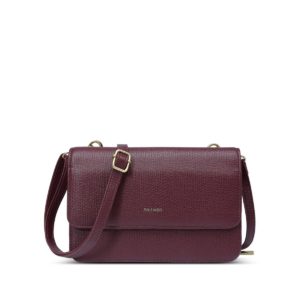
The best sustainable vegan handbag
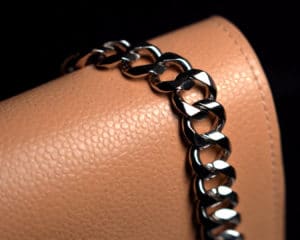
Best Canadian-made vegan handbag
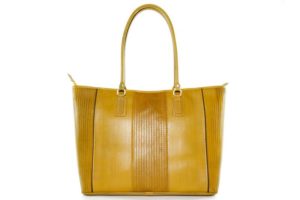
Best recycled handbag
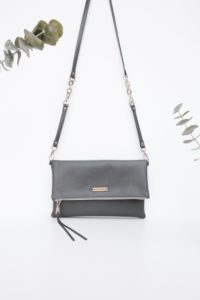
Best urban aesthetic vegan handbag
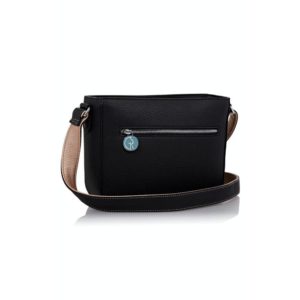
Best upcycled polyurethane vegan leather handbag
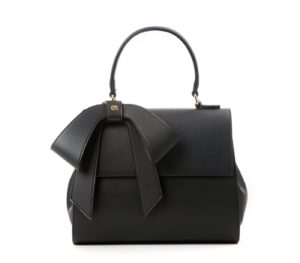
Best luxury upcycled vegan handbag
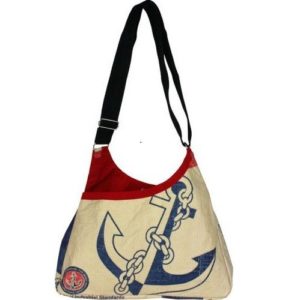
Best unique design vegan handbag
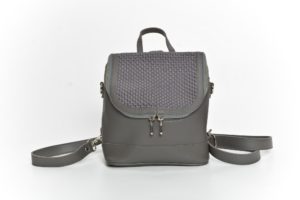
Best deadstock fabric handbag
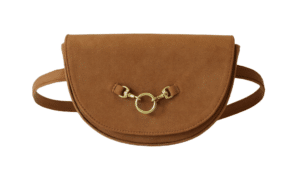
Best eco-suede vegan handbag
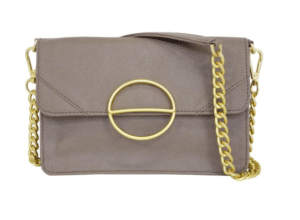
Best apple leather vegan handbag
Yup. Fashionistas are now spoilt for choice for vegan handbags and vegan ‘leather’ boots made with sustainable materials instead of the dreaded ‘pleather’ of old.
Certifications to look for
When choosing a vegan handbag, look for certifications such as:
Global Organic Textile Standard (GOTS)
OEKO-TEX Certified (for textiles free from or with very low levels of certain harmful chemicals)
Made Safe Certified (for products made using safe, non-toxic ingredients)
Certified B Corporation (for companies leading the way in environmental performance, transparency, and accountability)
Leaping Bunny Certified (for products that are Cruelty-Free)
Bluesign Certified (for textiles made according to strict standards for environmental and waterway impacts
Bear in mind that aside from GOTS, these other certifications offer no guarantee that a material is natural or organic in origin. For instance, OEKO-Tex, Bluesign, Made Safe, and Fair Trade products can all include synthetic fibers such as polyester, nylon, and acrylic, as well as conventional cotton.
Other certifications to look for include Fair Wear Foundation, International Labor Organization, SA8000, and WRAP, BSCI, which focus on fair labor practices and social accountability.
Some companies go above and beyond when it comes to sustainability, using green business practices throughout their operations. This can mean solar panels on the roof of a factory, use of 100% renewable energy, carbon offset programs, closed-loop and zero-waste manufacturing, takeback / repair / recycling / upcycling programs, and compostable / recycled / biodegradable shipping materials.
Why choose vegan leather?
The old argument is that leather is a by-product of the meat industry, so it’s a bit more forgivable to sport a leather bag than to eat a steak. The reality, though, is that leather is a valuable commodity in itself, especially calf leather, and makes a lot of money even if the flesh under that skin doesn’t sell as well. PETA estimate that 1 billion animals are raised and killed every year for leather alone.
What’s wrong with leather?
When choosing ethical and sustainable products, it pays to consider both animal welfare and the huge amounts of land, water, food, and fossil fuels involved in rearing animals and transporting animal-derived products. The production of animal leather also involves a lot of energy and toxic chemicals.
More than 250 chemicals are involved in leather tanning. These include arsenic, chrome, and cyanide, formaldehyde, coal-tar derivatives, chemical dyes and finishes, and so forth. These chemicals are dangerous for workers and for local communities as they are often flushed into nearby waterways where they harm the environment. Tannery workers have been seen in studies to be exposed to numerous known or suspected occupational carcinogens including hexavalent chromium salts, arsenic, organic solvents (benzene, formaldehyde, butyl acetate, ethanol, toluene and acetone).
Leather is also a manmade product masquerading as natural. This is because, once an animal skin is processed into leather, it can take more than a century to begin breaking down. During its time in landfill, leather releases toxic chemicals into soil and groundwater, causing ongoing environmental contamination.
Is vegan leather more sustainable?
Is vegan leather more eco-friendly? The short answer is… it depends. Vegan leather used to be made almost exclusively from plastic, hence ‘pleather’, or plastic leather. More often than not, this material was virgin plastic made with fossil fuels, using a barrage of chemicals in itself and breaking down faster than quality animal leather. Not so great for the wider environment, even if it’s better for animals short-term.
These days, though, vegan leather is more durable, can be manufactured in a wider variety of colors, is more flexible and lightweight, and can be used to make a wide array of products, including vegan handbags. And, happily, vegan leather is no longer exclusively plastic. New vegan leather sources include:
- Natural cork – very durable, waterproof, stain-resistant, and easy to maintain
- Pinatex (pineapple leather) – flexible, soft, but resilient leather alternative
- Organic waxed cotton patent leather – flexible, water-resistant, and easy to clean
- Recycled rubber – easy to maintain, durable, and helps divert rubber from landfill
- SCOBY leather – a newer material made from the SCOBYs used to make kombucha!
- Apple and fungi leather – newer materials made from sustainable sources and/or food waste
- Recycled PET or nylon – often sourced from recycled plastic bottles or salvaged fishing nets, rPET is a recycled and recyclable material with all the benefits of virgin plastic but much lower environmental impact.
- Polyurethane (PU) – though it’s still plastic, PU is easier to recycle and less harmful to produce than other types of plastic (or animal leather).
Given all the possible options for vegan leather, the sustainability of any one vegan handbag depends on how it is produced. In general, however, the environmental impact of a vegan handbag, even if made with virgin plastic, is going to be lower overall than the impact of an animal leather handbag (unless the leather is upcycled – see Mariclaro below!).
The best vegan leather handbags: our top picks
Here are our top picks for Vegan leather handbags.

Pixie Mood
Highlights: Climate positive and 100 percent vegan, Pixie Mood make super sustainable vegan handbags that are fashionable and friendly to animals, people, and the planet. Check out their Eco Mood collection!
Pixie Mood offer luxury vegan handbags made in a sustainable way and shipped climate positive in fully biodegradable packaging. All of the company’s products are vegan, made with solvent-free vegan leather. As of 2020, the bag linings are made entirely from recycled plastic bottles, and the company tests all materials annually to ensure they meet California’s Prop 65 standard for hazardous chemicals.
Eco-Mood is a new collection from the company and is about as eco-friendly as it gets. These bags are made with low-impact materials including recycled vegan leather, solvent-free vegan leather, recycled plastic linings, sustainably harvested cork, and hardware compliant with the European Union REACH standard which regulates hazardous chemicals.
As of January 2021, Pixie Mood is climate positive. This is thanks to a partnership with TerraPass which funds projects that eliminate greenhouse gasses and produce renewable energy. Such projects include using animal waste to generate electricity, converting landfill emissions, harnessing wind power and capturing methane emissions from abandoned coal mines. Pixie Mood partnered with TerraPass in 2020 to offset the company’s entire carbon emissions produced since 2010 when Pixie Mood was established. Now, on balance, every order shipped helps remove carbon from the atmosphere.
Pixie Mood bags are made in Asia in factories the company claims adhere to strict guidelines to ensure no child or forced labor, although there are no certifications to back this up. Pixie Mood donates a portion of profits to Girl Guides, Sick Kids, One Tree Planted, and the Human Society.

Segan
Highlights: Just launched November 2021, Segan is a Canadian brand making luxury vegan handbags that are sustainable and ethical. A pending B Corp, Segan uses plastic-free plant leather that is super sustainable.
Segan is an exciting new vegan brand just getting ready to launch. Based in Canada, Segan was established with ethics and sustainability top of mind. Indeed, the company name is an acronym: Sustainability, Ethical manufacturing, Gender equality, Activism, Nature. Segan has applied for B Corp status and is already a certified Fair Trade Workplace.
All of Segan’s products are PETA-approved vegan and plastic-free. Their signature material is Mirum®, a vegan plant leather made with all-natural materials and no plastic. This material is also recyclable and made in a low-impact, solvent-free process, making it much more sustainable than regular vegan leather made with polyurethane and other synthetic materials.
I reached out to the company to see when products might be available and the founder and Design Director, Mahdi Terani told me that the aim is to release the first two products before mid-December, 2021. He also enthused about the idea behind Segan, namely that his goal from day one has been to “eliminate the use of plastic at all costs while keeping our products vegan/cruelty-free, so you will never see zippers being used in our products (unless we find an alternative that meets all our values) and neither plastic reinforcements.” Mahdi noted that the only plastic component in these vegan handbags is the thread, despite great efforts to source a reliable non-plastic thread that holds up to stitching and use to make the bags genuinely sustainable.
Segan’s handbags have no dying or waterproofing treatment stage, so no need for concerns over chemicals there. They use 100% recycled and recyclable packaging, except for the rigid/product boxes that are 95% recycled and 100% recyclable. All the packaging is 100% plastic-free and cruelty-free, and the zero-waste factory process means that any MIRUM not used in the production is put aside and returned to the maker of Mirum to get turned back into usable material.
Mahdi also let me know that the company plans to launch a takeback program to recycled the bags for free at the end of life. He points out, though, that Segan products are explicitly designed to “go back to the earth safely after the hardware is separated and thread lines are cut off.”
Segan was also established with the goal of not just working with an ethically-run factory but to “make deeper connections between the artisans crafting the SEGAN products and our audience; So every SEGAN product proudly carries the signature of the artisan who made it on its back because the fashion house we’re making doesn’t belong to one person or family name but to all those who are fighting for our values.”
Segan has made efforts to keep the company’s supply chain as short as possible, with mostly North American suppliers (85% raw materials, main production, packaging). And while most of the company’s team works remotely, Segan HQ is located in KWENCH, a gold member of VIGB (Vancouver Island Green Business).
The company has partnered with OneTreePlanted to plant eight trees for every item sold, and Segan considers the full life-cycle of its products in assessing their impact on the planet. Another thing I like about Segan is that the company doesn’t offer gender-based collections, just products for people.

Elvis & Kresse
Highlights: Certified B Corp and all-round ethical company making vegan handbags from decommissioned fire hoses and other rescued materials in the UK! Only the fire hose collection is vegan and a few other Print Room collection items. Others feature off-cut leather. Company operations, packaging, and manufacturing are all environmentally sound and ethical!
Elvis & Kresse is a certified B Corp founded in 2005 after a chance encounter with the London Fire Brigade. The founders learned that damaged, decommissioned fire hoses in London, UK, were sent to landfill, amounting to hundreds of tons of material. Elvis & Kresse was set up to divert this waste and for the past 16 years none of London’s fire hose has gone to landfill. This adds up to more than 300 ton of material reclaimed, much of which has been turned into fashionable bags, belts, and, other accessories by Elvis & Kresse.
Building on the company’s success, a partnership was struck with the Burberry Foundation in 2017 to tackle global leather waste. Over 5 years, this partnership aims to divert at least 120 tons of leather off-cuts from Burberry into new luxury items designed by and sold by Elvis & Kresse.
Big on transparency, Elvis & Kresse has an open workshop in Kent, UK, in a listed and environmentally restored mill in the UK. You can visit the workshop to see the bags being made. They also make some products in the company’s Turkish factory in Istanbul. Manufacturing operations are run entirely on renewable energy. The company runs open-book accounting, is a certified Social Enterprise, and a fully accredited real Living Wage Employer by the Living Wage Foundation.
The company offers handbags, laptop sleeves, wallets, tablet cases, backpacks, briefcases, belts, and duffel bags. They also do custom and personalized products. All of their bags are made using fire hoses, military parachute ‘silk’ (actually nylon), air traffic control strips, auction banners, and other upcycled materials. Some items are made with upcycled leather, so check material information carefully as some listings misstate that the bags are vegan; I’ve alerted the company to this discrepancy. The belts, buckles, and D-rings on these bags are also more sustainable than most thanks to hardware made from recycled aluminum.
Only the fire-hose collection (Fire and Hide) is vegan, and the company donates 50% of profits from this line to the UK Fire Fighters Charity. For other lines, Elvis & Kresse also donates up to 50% of profits to charities related to reclaimed materials, such as the WWF and CafeDirect. The company operates on a triple bottom line business model, meaning the focus is as much on charitable giving and waste diversion as it is on profit.
Elvis & Kresse make a point of using recycled packaging. This means your bag may arrive with packaging made using jute or hessian coffee sacks, tea bag paper, printing blankets, shoe boxes, and other reused materials. To further promote sustainability, the company offers a lifetime repair policy, though it’s easiest to take advantage of this if you live in the UK.
I love that the whole ethos at Elvis & Kresse is based on kintsugi, the Japanese art of repairing broken pottery with gold. Thus, these upcycled pieces are worth much more than a similar, undamaged counterpart.
Worried about the weight of a bag made from fire hose? Don’t fret! Elvis & Kresse re-engineer the hose to make ideal bag fabric. In fact, the company’s Messenger Bag weighs less than an equivalent leather messenger bag at around 1.35 kg.

Carry Courage
Highlights: Vegan handbags handmade using sustainable materials such as cork, GOTS cotton, and linen by an eco-conscious company in Portland, Oregon. PETA-approved, these bags can be repaired for free for life!
Carry Courage offer a range of vegan bags with a more urban aesthetic. These are made using materials such as cork and linen, with an eye on sustainability. The company also offers a free repair service as Carry Courage wants you to keep using your bag.
The totes, clutches, cross-body bags, wallets, essential oil bags, and other items are made using cork leather with a GOTS certified organic cotton or linen lining. These are eco-friendly and easily washable with mild dish soap. The bags are also naturally antimicrobial and water-resistant.
Cork is an excellent sustainable material as cork trees benefit from having their bark harvested. The bark regenerates every 8-10 years and after stripping, the trees absorb significantly more carbon dioxide (helping to reduce greenhouse gases). Carry Courage sources cork from sustainable forests in Portugal with strict harvesting practices and the cork fabrics are PETA-approved vegan.
Linen is also an excellent biodegradable material that can be easily grown without the use of pesticides. Carry Courage sources linen from a family-owned supplier in the US. The metal hardware used in the bags is also sourced in the US, from a woman-owned company.
The bags are handmade in the company’s homebased studio in Portland, Oregon, in small runs, which helps to minimize waste and energy use. Carry Courage uses 100% recycled and recyclable packaging when shipping products, and the company’s processes are essentially zero-waste as any cork scraps are used to make EXPLORER keychain luggage tags. Any scraps smaller than this are responsibly recycled.
If your bag needs repairing, Carry Courage will do it free of charge as long as you cover shipping.
Carry Courage is a woman-owned company and part of the Female Founder Collective.

GSK
Highlights: Upcycled polyurethane vegan leather luxury handbags from an award-winning company focused on slow fashion and sustainability.
GSK’s Morphbag collection is a luxury vegan handbag line combining high fashion and sustainability. The reversible tote is big enough for work, travel, and schlepping around miscellaneous kid paraphernalia, while a crossbody bag and clutch offer smaller styles. Each bag is available in three colors designed to work across seasons and complement a capsule wardrobe, further promoting sustainable fashion.
The Morphbag line is made with polyurethane (PU) but it is certified upcycled PU vegan leather, meaning that no virgin plastic is used for these bags. The certification is through Global Recycled Standard (GRS), meaning it is credible. Bags are made in China in a factory regularly audited to ensure fair working standards.
Adding to its sustainability, the lining inside the crossbody bag is made with recycled water bottles, and the dust bags are GOTS and Fairtrade certified. The line is PETA-approved vegan and Vegan Society certified too and water-based inks are used for printed logos. All items are shipped in FSC certified boxes and for every bag purchased, a tree is planted in the Amazon Rainforest.
GSK is a member of the Conscious Fashion Campaign and is working to help achieve the United Nations Sustainable Development Goals (SDG). The Morphbag won Best Slow Fashion Brand in 2020 at the Eluxe Awards and The Best Ethical Fashion Brand this year. Not bad for a brand established in 2018.

Gunas New York
Highlights: Longstanding, award-winning vegan handbag brand making mostly synthetic bags with some recycled materials and one exciting new bag with eco-friendly plant-based leather. Carbon neutral shipping is available, and it’s a totally vegan company that is also BIPOC and female-owned.
GUNAS New York is a longstanding vegan handbag brand that has frequently led the way in innovative, sustainable, vegan-friendly fashion. This award-winning company boasts PETA USA’s Best Vegan Handbag for Men award in 2013, Best Green Handbag Designer Award by Instyle Magazine in 2015, and #1 Vegan Handbag Brand globally in 2017 by HuffPost among others.
I first encountered GUNAS in the early 2010s (the company was founded in 2009) and have enjoyed seeing the brand gain a solid reputation for making luxury vegan handbags and other bags and accessories. In recent years the company has partnered with EcoCart to enable customers to make orders 100% Carbon Neutral through an offsetting program at checkout. This means that GUNAS promises to “eliminate, capture, or otherwise mitigate all of the carbon emissions created from making GUNAS products and shipping them to your door.”
The first GUNAS collection was handmade in New York by artisans in the city’s fashion district. The founder then tried to make more affordable bags by using Chinese factories but quickly felt that this wasn’t the right fit for an ethical vegan handbag. They now make their bags in South Korea, India, and Italy, with a small group of artisan studios that cut, sew, and finish each bag by hand. That means these bags are not ‘fast fashion’ like most bags made in China under poor working conditions.
GUNAS takes a comprehensive view of veganism to include doing no harm to the humans making the company’s products. This means they are committed to paying above-average wages to their artisans. GUNAS also donates a portion of profits to a variety of vegan charities and non-profits and donates products for fundraisers and such too.
The bags themselves are made using 100% vegan and cruelty-free materials. This means no animal leather, silk, fur, wool, bone, horn, or animal byproduct adhesives. Instead, GUNAS uses:
- Polyurethane coated cotton canvas
- Microfibers upholstery fabrics
- Recycled plastic bottle lining (rPET)
- Recycled paperboard for inner construction
- Recycled metals for hardware.
GUNAS acknowledges that this means a lot of plastic, which isn’t very eco-friendly. Their stance is that it’s still more eco-friendly than the animal agriculture industry which produces the majority of the world’s methane emissions as well as a lot of toxic chemical run-off from leather tanning.
Happily, GUNAS also recently developed a vegan leather alternative that is more eco-friendly than plastic: MULBTEX™. This material is made in Korea from the mulberry plant. It totally plastic-free and consists of a cotton base coated with mulberry leaf pulp. This makes the material waterproof, silky, and strong. The GUNAS Moby bag is the first bag made using Mulbtex and was designed with men in mind. I’m excited to see more GUNAS bags made with this material, helping to cut down on the use of plastic in these vegan handbags.
Mulbtex is plastic-free, lightweight, waterproof, and ages similarly to real leather. GUNAS uses hardware sourced from Italy and South Korea, with fabrics (including faux nylons, eco-polyurethane, synthetic microfibers and ultra-suede) sourced from Japan, France, Germany, Switzerland, Taiwan, and the US and threads from Germany. The company claims the fabrics are manufactured using non-toxic methods, but there are no certifications guaranteeing as such. GUNAS do not use any PVC or vinyl in their products and lining fabrics are made from recycled plastic bottles or up-cycled cotton twills.
GUNAS offer more than just vegan handbags, with styles ranging from totes, satchels, cross-body bags, wallets and backpacks. You can get free shipping with an order over $150 in the US and Canada, and prices range from around $125 on sale to $275.

Malia Designs
Highlights: Affordable, unique, vegan handbags, clutches, totes, and more from a fair trade company based in Cambodia. Made using upcycled materials such as cement and feed bags, denim, and cotton canvas.
Malia Designs was founded in 2005 by Lia Valerio and makes fair trade vegan handbags and purses in Cambodia using sustainably sourced and recycled materials under fair working conditions.
The wide-ranging collection is inspired by Angkor temples and the bustling streets, full of color and texture, of Phnom Penh. Malia Designs uses recycled cotton canvas, upcycled denim, recycled cement and feed bags, and other materials to create these #CarryaCause bags. The recycled fish feed bags are made with colorful, lightweight, durable and water-resistant material, making them ideal for upcycling into vegan handbags.
The company provides a fair, livable wage for all workers, ensures safe working conditions, promotes environmentally sound business practices, and takes other steps to create healthy, happy communities locally and globally. Malia Designs also donates a portion of profits to anti-trafficking efforts, with more than $160,000 donated already to non-governmental organizations helping at-risk children and victims of trafficking.
Malia works with women-led fair fashion cooperatives that employ Deaf and disabled individuals, women, and other people often marginalized in the workforce. The company also offers grants for training, workshop operations, and new equipment to local artisans.
It’s not clear if Malia Designs uses recycled packaging materials, zero-waste practices, or has any other sustainability initiatives, but they do seem to use pretty much exclusively upcycled materials.

Madison Grace
Highlights: Offers a small number of vegan handbags made with natural materials and upcycled deadstock fabrics including vegan leather. The company is US-based and makes an effort to offer carbon-neutral shipping using sustainable packaging materials.
Madison Grace only offers a small collection of vegan handbags which are beautifully made and very affordable. The San Diego bag is handwoven using palm leaves, with sisal cord handles, while other bags are made using deadstock fabric. Some items are made with animal leather, so check each item listing carefully before buying.
The company’s bestselling bag, the Quinn Mini Backpack is vegan-friendly as it is made using vegan leather and other deadstock fabric. Madison Grace source this through a partnership with social enterprise Rags to Riches (R2R) that finds fabrics sitting in fashion warehouses and otherwise destined for landfill.
Madison Grace bags are made in the Philippines, Morocco, India, and other locations, with efforts made to provide dignified work opportunities for marginalized communities and individuals, including through India’s Freeset, a social enterprise that employs female victims of sex trafficking.
The company chooses sustainable shipping practices to make things carbon neutral wherever possible. The company doesn’t appear to be a member of 1% for the Planet but does claim to donate to the non-profit. Madison Grace also uses recycled and recyclable packaging materials made in the US.

HFS Collective
Highlights: PETA-approved vegan bags made with a variety of low-impact, recycled, upcycled, or deadstock materials including some polyurethane in some items. Oeko-Tex certified and made in LA by a company that donates 2% of profits to charity.
HFS Collective was founded in 2012 by a mother-daughter team in California and offers PETA-approved vegan-friendly bags made with recycled and deadstock materials, pineapple leather, hemp, cork, organic cotton, and vintage denim, as well as some polyurethane (vegan leather). The bags are made at a small, family-run factory in Los Angeles under fair working conditions where workers earn a living wage.
Some HFS Collective bags feature eco suede made from post-industrial recycled polyester and post-consumer recycled plastic bottles. These materials are Oeko-Tex certified as low or free from VOCs, heavy metals, and azo dyes. All HFS Collective bags are lined with either organic cotton or eco suede.
HFS Collective gives back to the community through charitable organizations like LA’s TreePeople, Garment Worker Center, Farm Sanctuary, Mercy for Animals, and others.

Nuuwaï
Highlights: Vegan handbags and purses made using Oeko-Tex certified apple leather (contains 50 percent polyurethane) and recycled ocean plastic. Made under fair labor conditions and shipped using recycled materials.
Nuuwaï handbags and purses that are PETA approved as vegan-friendly. These bags are made with Oeko-Tex 100 certified apple leather and Nuuwaï was voted best vegan brand in 2019 by Eluxe Magazine.
The company was founded in 2018 by Svenja Detto, an ethical vegan, after seeing a news report about apple scraps. Annoyed by the plethora of purely synthetic vegan bags on the market, Detto set about sourcing her own vegan leather to make bags with much less plastic.
Apple scrap leather is created from apple scraps that are dried, milled, and then mixed with polyurethane and applied to cotton fabric. The material is then washed to make it pliable and is lined with material made from recycled ocean plastic sourced from EcoAlf as off-cuts. The apple scrap leather is made in Italy, the linings in China, tags and miscellany in Germany, and the bags and hardware are made in India using a zero-waste manufacturing process.
Nuuwaï is also committed to fair labor standards and works with a regularly audited factory in India to produce their goods. Production is certified with SMETA, an audit by Sedex, which ensures no child labor or forced labor, discrimination, or unfair working conditions.
Nuwaii uses recycled shipping materials made in the USA through a partnership with EcoEnclose. These materials comprise 95% post-consumer waste and 5% post-industrial waste.
What about sustainable and ethical leather – Mariclaro
While Mariclaro doesn’t make vegan bags, they do make eco-friendly handbags (as well as purses and clothing). How so? Because this company, based in Canada, uses upcycled leather from airplane and car seats, etc., to create brand new handbags and other items.
Arguably much more sustainable than a vegan handbag made with fresh plastic, Mariclaro bags are also works of art, with every bag a unique design.
I also love that the company uses a supply chain as local as possible, in addition to upcycled airline materials. Mariclaro sources leather and upholstery off-cuts from Toronto factories and wrecking yards in New York and Ontario, for example. Even the buckles and closures are made using upcycled seatbelts and so forth.